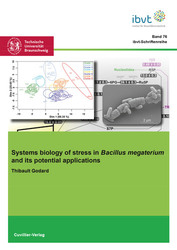| Areas | |
|---|---|
| Serie de libros (96) |
1381
|
| Nachhaltigkeit |
3
|
| Gesundheitswesen |
1
|
| Letra |
2370
|
| Ciencias Naturales |
5408
|
| Ciencias Ingeniería |
1795
|
| Ingeniería | 292 |
| Ingeniería mecánica y de proceso | 862 |
| Ingeniería eléctrica | 688 |
| Mineria y metalurgía | 30 |
| Arquitectura e ingeniería civil | 75 |
| General |
98
|
|
Leitlinien Unfallchirurgie
5. Auflage bestellen |
|
Erweiterte Suche
Systems biology of stress in Bacillus megaterium and its potential applications (Volumen 76) (Tienda española)
Thibault Godard (Autor)Rainer Krull (Editor)
Previo
Lectura de prueba, PDF (850 KB)
Indice, PDF (58 KB)
Generally, once a producer has been genetically designed, optimal process parameters are established to maximise its potential for industrial production. Despite this upstream work, bacterial cells are constantly exposed to various kinds of stress during the whole production process, including e.g. mechanical induced stress, high nutrient or product concentrations and variations of temperature, medium composition or oxygen availability.
In this context, the main objective of this work was to investigate more deeply the impact of harsh cultivation temperatures (between 15 and 45°C) and osmotic stress (mimicked using up to 1.8 M NaCl) on the metabolism of the wild-type B. megaterium DSM319 during unlimited growth. To this end, a holistic study including transcriptome, proteome, metabolome and fluxome analyses was performed to offer an integrated picture of cellular adaptation and to find underlying genetic targets for the development of more robust production hosts.
Interestingly, while both stress conditions resulted in disruption of redox balance, decreased biomass yields and reduced substrate uptake rates, the flux distribution within the central carbon and energy metabolism as well as the levels of the corresponding mRNAs and proteins were only locally affected. On the contrary, significant modulation of metabolite pools was observed and might constitute a key mechanism to compensate for loss of enzyme activity and maintain or adjust metabolic fluxes under stressful conditions. In addition, specific responses occurring at every biological level were detected in both cases. In particular, exposure at high and low temperature triggered the production of so-called heat and cold shock proteins, respectively, whose functions support sustained growth under these adverse conditions. Under ionic osmotic stress, on the other hand, the whole metabolic machinery was reorganised towards production of the osmoprotectant proline using an alternative pathway only active under this condition.
More surprisingly, although B. megaterium has long been known for its capacity to produce the biopolymer polyhydroxybutyric acid (PHB), a positive correlation between intracellular PHB content and salt concentration could be demonstrated for the first time. As neither the concentration of the enzymes involved in the classical PHB-pathway nor that of their related mRNAs significantly increased, these proteins were systematically overproduced in new plasmid strains, resulting in an up to 75 % higher PHB content. Finally, in silico modelling using elementary flux mode analysis was applied and highlighted new genetic targets for the further improvement of PHB production in B. megaterium.
| ISBN-13 (Impresion) | 9783736993365 |
| ISBN-13 (E-Book) | 9783736983366 |
| Formato | A5 |
| Idioma | Inglés |
| Numero de paginas | 236 |
| Laminacion de la cubierta | mate |
| Edicion | 1. Aufl. |
| Serie | Schriftenreihe des Institutes für Bioverfahrenstechnik der Technischen Universität Braunschweig |
| Volumen | 76 |
| Lugar de publicacion | Göttingen |
| Lugar de la disertacion | Braunschweig |
| Fecha de publicacion | 06.09.2016 |
| Clasificacion simple | Tesis doctoral |
| Area |
Ingeniería mecánica y de proceso
|
| Palabras claves | Systems biology, Bacillus megaterium, osmotic stress, temperature stress, flux analysis, proteomics, metabolomics, transcriptome analysis, polyhydroxybutyric acid (PHB) |








